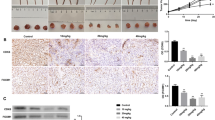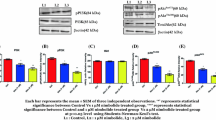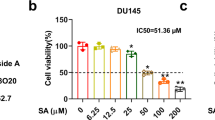Abstract
Purpose: One of the most relevant aspects in cell death regulation is the signalling of apoptosis by the serine/threonine kinases MAPKs. The aim of this study was to investigate the effects of TNF-α stimulation on MAPK activation, and the pro- or anti-apoptotic role of these kinases in LNCaP and PC3 cells. Material and methods: Treatments were carried out using several TNF-α concentrations, as well as specific pharmacological inhibitors of MAPKs. Apoptosis rates were evaluated by DAPI staining and flow cytometry. MAPK phosphorylation/activation was measured by Western blot. Results: TNF-α induced apoptosis in a dose-dependent manner in LNCaP but not in PC3 cells. The MAPK inhibitors revealed that the apoptotic rate in LNCaP cells increased significantly following p38 inhibition. The kinase inhibitors failed to cause changes in apoptosis in PC3 cells. Conclusions: The potentiation of apoptosis by p38 inhibition points to this kinase as a possible target for the treatment of androgen-dependent prostatic cancer.
Similar content being viewed by others
References
Szlosarek PW, Balkwill FR (2003) Tumour necrosis factor alpha: a potential target for the therapy of solid tumours. Oncology 4:565–573
Lejeune FJ, Ruegg C, Lienard D (1998) Clinical applications of TNF-alpha in cancer. Curr Opinion Immunol 10:573–580
Kollias G, Douni E, Kassiotis G, Kontoyiannis D (1999) On the role of tumor necrosis factor and receptors in models of multiorgan failure, rheumatoid arthritis, multiple sclerosis and inflammatory bowel disease. Immunol Rev 169:175–194
Balkwill F (2002) Tumor necrosis factor or tumor promoting factor? Cytokine Growth Factor Rev 13:135–141
Cross TG, Scheel-Toellner D, Henriquez NV, Deacon E, Salmon M, Lord JM (2002) Serine/threonine protein kinases and apoptosis. Exp Cell Res 256:34–41
Ichijo H, Nishida E, Irie K, Dijke P, Saitoh M, Moriguchi T, Takagi M, Matsumoto K, Miyazono K, Gotoh Y (1997) Induction of apoptosis by ASK-1, a mammalian MAPKKK that activates SAPK/JNK and p38 signaling pathways. Science 275:90–94
Lüschen S, Scherer, Ussat S, Ungenfroren H, Adam-Klages S (2004) Inhibition of p38 mitogen-activated protein kinase reduces TNF-induced activation of NF-kB, elicits caspase activity, and enhances cytotoxicity. Exp Cell Res 293:196–206
Beg AA, Baltimore D (1996) An essential role for NF-kappaB in preventing TNF-alpha-induced cell death. Science 274:782–784
Kim JA, Kim DK, Kang OH, Choi YA, Park HJ, Choi SC, Kim TH, Yun KJ, Nah YH, Lee YM (2005) Inhibitory effect of luteolin on TNF-alpha-induced IL-8 production in human colon epithelial cells. Immunopharmacol 5:209–217
De Miguel MP, Royuela M, Bethencourt FR, Santamaria L, Fraile B, Paniagua R (2000) Immunoexpression of tumour necrosis factor-alpha and its receptors 1 and 2 correlates with proliferation/apoptosis equilibrium in normal, hyperplasic and carcinomatous human prostate. Cytokine 12:535–538
Royuela M, Arenas MI, Bethencourt FR, Sanchez Chapado M, Fraile B, Paniagua R (2002) Regulation of Proliferation/Apoptosis equilibrium by mitogen-activated protein kinases in Normal, Hyperplastic, and carcinomatous human prostate. Human Pahthol 33:299–306
Ricote M, Royuela M, Garcia-Tunon I, Bethencourt FR, Paniagua R, Fraile B (2003) Pro-apoptotic tumor necrosis factor-alpha transduction pathway in normal prostate, benign prostatic hyperplasia and prostatic carcinoma. J Urol 170:787–790
Kimura K, Bowen C, Spiegel S, Gelmann EP (1999) Tumor necrosis factor-alpha sensitizes prostate cancer cells to gamma-irradiation-induced apoptosis. Cancer Res 59:1606–1614
Foa R, Massaia M, Cardona S, Tos AG, Bianchi A, Attisano C, Guarini A, di Celle PF, Fierro MT (1990) Production of tumor necrosis factor-alpha by B-cell chronic lymphocytic leukemia cells: a possible regulatory role of TNF in the progression of the disease. Blood 76:393–400
Sintich SM, Steinberg J, Kozlowski JM, Lee C, Pruden S, Sayeed S, Sensibar JA (1999) Cytotoxic sensitivity to tumor necrosis factor-alpha in PC3 and LNCaP prostatic cancer cells is regulated by extracellular levels of SGP-2 (clusterin). Prostate 39:87–93
Moore RJ, Owens DM, Stamp G, Arnott C, Burke F, East N, Holdsworth H, Turner L, Rollins B, Pasparakis M, Kollias G, Balkwill F (1999) Mice deficient in tumor necrosis factor-alpha are resistant to skin carcinogenesis. Nat Med 5:828–831
Zhang S, Han J, Sells MA, Chernorff J, Knaus UG, Ulevitch RJ, Bokoch GM (1995) Rho family GTPases regulate p38 mitogen-activated protein kinase through the downstream mediator PAK1. J Biol Chem 270:23934–23936
Ogasawara T, Yasuyama M Kawauchi K (2003) Constitutive activation of extracellular signal-regulated kinase and p38 mitogen-activated protein kinase in B-cell lymphoproliferative disorders. Int J Hematol 77:364–370
Vaarala MH, Porvari K, Kyllonen A, Vihko P (2000) Differentially expressed genes in two LNCaP prostate cancer cell lines reflecting changes during prostate cancer progression. Lab Invest 80:1259–1268
Aihara M, Scardino PT, Truong LD, Wheeler TM, Goad JR, Yang G, Thompson TC (1995) The frequency of apoptosis correlates with the prognosis of Gleason Grade 3 adenocarcinoma of the prostate. Cancer 75:522–529
Kanabbe C, Kellner U, Schmahl M, Voigt KD (1991) Growth factors in hyman prostate cancer cells: implications for an improved treatment of prostate canc. J Steroid Biochem Mol Biol 40:185–192
Author information
Authors and Affiliations
Corresponding author
Additional information
Supported by grants from the Fondo de Investigaciones Sanitarias (PI020383) and University of Alcalá.
Rights and permissions
About this article
Cite this article
Ricote, M., García-Tuñón, I., Fraile, B. et al. P38 MAPK protects against TNF-α-provoked apoptosis in LNCaP prostatic cancer cells. Apoptosis 11, 1969–1975 (2006). https://doi.org/10.1007/s10495-006-0086-9
Published:
Issue Date:
DOI: https://doi.org/10.1007/s10495-006-0086-9




